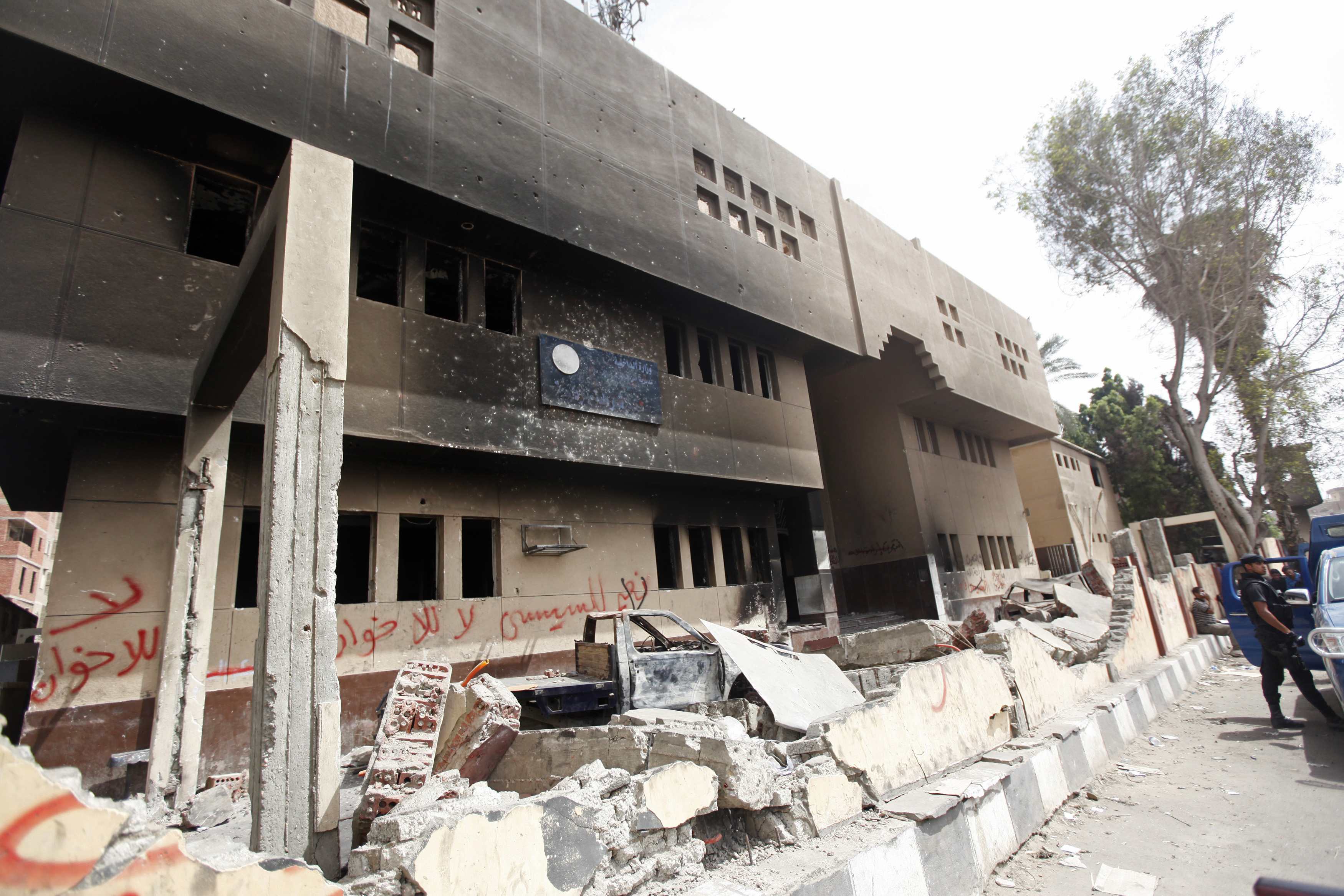Latest NEWS
- Aswat Masriya, the last word
- Roundup of Egypt's press headlines on March 15, 2017
- Roundup of Egypt's press headlines on March 14, 2017
- Former Egyptian President Hosni Mubarak to be released: lawyer
- Roundup of Egypt's press headlines on March 13, 2017
- Egypt's capital set to grow by half a million in 2017
- Egypt's wheat reserves to double with start of harvest -supply min
- Roundup of Egypt's press headlines on March 12, 2017
Court ratifies death sentences to 183 over Kerdasa clashes

A view shows a damaged police station burnt in a blaze by supporters of former president Mohamed Mursi in Kerdasa, a town 14 km (9 miles) from Cairo in this September 19, 2013 file photograph. An Egyptian judge sentenced 185 Muslim Brotherhood supporters to death on December 2, 2014 over an attack on a police station near Cairo last year in which 12 policemen were killed. REUTERS/Mohamed Abd El Ghany
CAIRO, Feb 2 (Aswat Masriya) – The Giza Criminal Court ratified on Monday death sentences served to 183 defendants accused of killing policemen in Giza's Kerdasa neighbourhood in 2013, after consulting Egypt's Grand Mufti.
One-hundred and eighty five defendants were referred to Egypt’s Grand Mufti on December 2, 2014 to consider their death sentences.
The prosecution had referred 188 defendants to court, accusing them of breaking into the main police station in Kerdasa, a town 14 km from Cairo, killing at least 11 policemen, mutilating their bodies, and the attempted murder of 10 others.
The court sentenced a minor to 10 years in prison and dropped the charges against two defendants who have died. Two more defendants were also acquitted of the charges on Monday.
Of the 183 sentenced to death, 34 defendants were sentenced in absentia.
The verdict was strongly condemned by human rights watchdog Amnesty International, which described it as a "further sign of Egypt's disregard for national and international law."
"Today's death sentences are yet another example of the bias of the Egyptian criminal justice system," said Hassiba Hadj Sahraoui, Deputy Middle East and North Africa Programme Director at Amnesty International. "Issuing mass death sentences whenever the case involves the killing of police officers now appears to be near-routine policy, regardless of facts and with no attempt to establish individual responsibility."
A court in Minya has served over 1000 Muslim Brotherhood supporters preliminary death sentences in March and April 2014, also for killing policemen and storming police stations in August 2013.
The same court later ratified the death sentences of 220 of the said defendants after consulting the Mufti. The sentenced defendants included Mohamed Badie, the Muslim Brotherhood's supreme guide.
Referral of files to the Mufti is a procedural step taken to decide whether or not a defendant may be sentenced to death. Though the Mufti's decisions are not legally binding, it is customary for the court to adopt them.
Human Rights Watch (HRW) had criticised last December the mass death sentence issued against the 185 defendants.
The international watchdog emphasised that "serious crimes were committed during the Kerdasa attack", but stressed the right of those responsible to a fair trial. It added that it was "unfair" for everyone to be tried in mass proceedings.
The violence in Kerdasa came shortly after police forces forcibly dispersed two sit-ins in support of former President Mohamed Mursi on August 14, 2013, causing the death of hundreds of protesters in what was described by Human Rights Watch as "the most serious incident of mass unlawful killings in modern Egyptian history."
Authorities have led a crackdown on Muslim Brotherhood members and supporters since the military ouster of Mursi in July 2013. Mursi himself is in jail, facing a string of charges in more than one court case.










